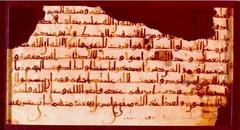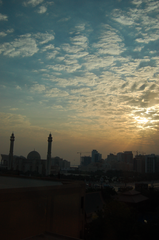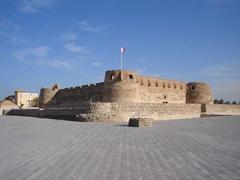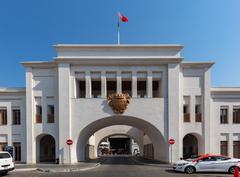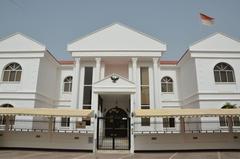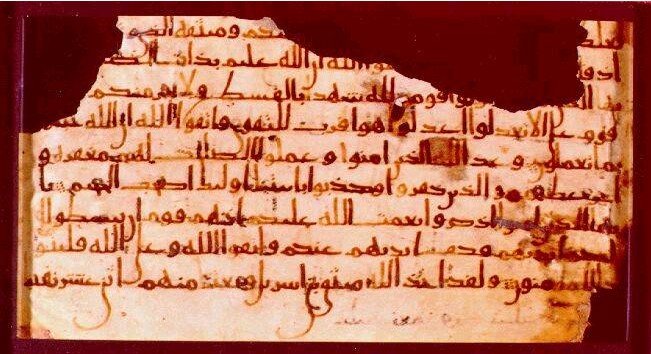
Visiting Beit Al Quran in Manama, Bahrain: Hours, Tickets, and Cultural Insights
Published Date: 24/07/2024
Introduction
Nestled in the vibrant city of Manama, Bahrain, Beit Al Quran is a monumental beacon of Islamic culture and heritage. Established in 1990 by Dr. Abdul Latif Jassim Kanoo, this institution is more than just a museum; it is a center for education, research, and community engagement. Whether you’re a history buff, a scholar, or a curious traveler, Beit Al Quran offers a rich and immersive experience. The museum is renowned for its extensive collection of Quranic manuscripts, early translations, and Islamic artifacts, providing visitors with a unique opportunity to delve into over 1,400 years of Islamic history and art (omeeyo.com).
The significance of Beit Al Quran extends beyond its collections. Architecturally, it stands as a testament to traditional Islamic design, featuring intricate geometric patterns, calligraphy, and arabesque designs that create a spiritual and contemplative atmosphere. This architectural splendor is not merely decorative but aligns with the museum’s purpose of preserving and promoting Islamic heritage (explorebeds.com).
Visitors to Beit Al Quran can explore a myriad of exhibits, including some of the earliest European translations of the Quran and a specialized library housing works on Islamic history, art, and calligraphy. The museum also regularly hosts special exhibitions, lectures, and cultural festivals, making it a dynamic hub for cultural exchange and scholarly research (Wikipedia).
This guide provides detailed information on the exhibits, visiting hours, ticket prices, and more to help you plan your visit to Beit Al Quran, ensuring you have a memorable and enriching experience.
Table of Contents
- Introduction
- History and Significance
- Collections and Exhibits
- Visiting Information
- Educational and Research Initiatives
- Community Engagement
- Visitor Tips
- Accessibility
- FAQ
- Conclusion
- References
History and Significance
Establishment and Vision
Beit Al Quran, located in the heart of Manama, Bahrain, was established in 1990 by Dr. Abdul Latif Jassim Kanoo. The institution was founded with a clear vision: to serve as a beacon of Islamic culture and heritage. Dr. Kanoo’s ambition was to create a space that not only preserved Islamic art and Quranic manuscripts but also promoted education and research in Islamic studies. This vision has been realized through the museum’s extensive collections and its role as a hub for scholarly activities (omeeyo.com).
Architectural Significance
The architecture of Beit Al Quran is a testament to traditional Islamic design. The building features intricate geometric patterns, calligraphy, and arabesque designs that are characteristic of Islamic art. These elements are not merely decorative but serve to create a spiritual and contemplative atmosphere, aligning with the museum’s purpose. The design of the building itself is a reflection of the rich Islamic heritage that it aims to preserve and promote (explorebeds.com).
Collections and Exhibits
Quranic Manuscripts
One of the most significant aspects of Beit Al Quran is its collection of Quranic manuscripts. The museum houses an impressive array of manuscripts that span over 1,400 years of history. These manuscripts are not only valuable for their religious significance but also for their artistic and historical value. Some of the manuscripts date back to the early Islamic period, providing a unique glimpse into the development of Quranic calligraphy and illumination over the centuries (omeeyo.com).
Islamic Artifacts
In addition to Quranic manuscripts, Beit Al Quran also boasts a diverse collection of Islamic artifacts. These include ceramics, metalwork, textiles, and glassware, each piece reflecting the rich cultural and artistic traditions of the Islamic world. The artifacts are displayed in a manner that highlights their historical context and artistic significance, offering visitors a comprehensive understanding of Islamic art and culture (explorebeds.com).
Visiting Information
Visiting Hours and Tickets
Beit Al Quran is open from Saturday to Wednesday, 3:00 pm to 6:00 pm, and from Saturday to Thursday, 9:00 am to 1:00 pm. It is advisable to check the opening hours before visiting, as they may vary, especially during Islamic holidays. Currently, there is no entrance fee, but donations are welcome to support the museum’s activities (omeeyo.com).
Special Events and Photographic Spots
The museum hosts various special events throughout the year, including exhibitions, lectures, and cultural festivals. Visitors are encouraged to check the museum’s official website or contact them directly for the latest information on upcoming events. For photography enthusiasts, Beit Al Quran offers numerous picturesque spots, particularly within its beautifully designed interiors and exhibits.
Educational and Research Initiatives
Guided Tours and Workshops
Beit Al Quran is not just a museum; it is also a center for education and research. The institution offers guided tours, lectures, workshops, and seminars on various aspects of Islam. These educational initiatives are designed to cater to visitors of all ages and backgrounds, fostering a deeper understanding of Islamic culture and heritage. The guided tours, in particular, provide an in-depth exploration of the museum’s collections, led by knowledgeable guides who offer insights into the historical and cultural significance of the exhibits (explorebeds.com).
Research Opportunities
The museum also serves as a hub for scholarly research. It attracts scholars from around the world who come to study its extensive collections. The institution provides resources and facilities for researchers, including access to rare manuscripts and artifacts. This focus on research underscores Beit Al Quran’s commitment to advancing knowledge and understanding of Islamic studies (omeeyo.com).
Community Engagement
Cultural Events
Beyond its role as a museum and research center, Beit Al Quran is also a hub for community engagement. The institution hosts a wide range of cultural events that bring together people from diverse backgrounds. These events include exhibitions, lectures, and cultural festivals that celebrate the shared heritage of humanity. By fostering dialogue and understanding among people of all faiths and cultures, Beit Al Quran plays a vital role in promoting cultural exchange and mutual respect (explorebeds.com).
Interactive Displays
One of the highlights of Beit Al Quran is its interactive displays, particularly the Quranic Path exhibition. This unique exhibition takes visitors on a journey through the history of the Quran, featuring interactive displays that deepen their understanding of Islam’s holiest book. These interactive elements make the museum’s exhibits more engaging and accessible, particularly for younger visitors and those new to Islamic studies (explorebeds.com).
Visitor Tips
Respectful Conduct
Visitors to Beit Al Quran are encouraged to maintain a respectful demeanor throughout their visit, especially in the mosque and prayer areas. Speaking in hushed tones and avoiding loud noises is appreciated. This respectful conduct helps preserve the contemplative atmosphere of the museum and ensures a pleasant experience for all visitors (omeeyo.com).
Optimal Visiting Times
Checking the opening hours before visiting is advisable, as they may vary, especially during Islamic holidays. Visiting during non-peak hours can provide a more peaceful and personal experience. The museum is open from Saturday to Wednesday, 3:00 pm to 6:00 pm, and from Saturday to Thursday, 9:00 am to 1:00 pm (omeeyo.com).
Accessibility
Location and Transportation
Beit Al Quran is located in the Hoora area of Manama, making it easily accessible by various modes of transportation. For those driving, there is ample parking available nearby. Public transportation options include buses and taxis, which are readily available throughout Manama. For international visitors, Beit Al Quran is a short drive from Bahrain International Airport, making it a convenient destination for tourists (omeeyo.com).
Tour Services
Many hotels in Manama offer tour services that include Beit Al Quran, providing a hassle-free option for travelers to visit this iconic landmark. For those who prefer a more adventurous approach, renting a bicycle or walking, if staying nearby, can be a delightful way to explore the city and reach Beit Al Quran (omeeyo.com).
FAQ
Q: What are the visiting hours of Beit Al Quran? A: Beit Al Quran is open from Saturday to Wednesday, 3:00 pm to 6:00 pm, and from Saturday to Thursday, 9:00 am to 1:00 pm (omeeyo.com).
Q: How much are the tickets for Beit Al Quran? A: Currently, there is no entrance fee, but donations are welcome to support the museum’s activities (omeeyo.com).
Q: Are there any special events at Beit Al Quran? A: Yes, the museum hosts various special events throughout the year, including exhibitions, lectures, and cultural festivals. Check the museum’s official website for the latest information on upcoming events (omeeyo.com).
Conclusion
Beit Al Quran in Manama, Bahrain, stands as a remarkable institution dedicated to the preservation and promotion of Islamic culture and heritage. From its extensive collection of Quranic manuscripts and Islamic artifacts to its role as a center for education and research, the museum offers a multifaceted experience for visitors of all backgrounds. The architectural beauty of Beit Al Quran, combined with its rich exhibits and educational initiatives, underscores its significance as a cultural and scholarly hub (omeeyo.com).
Whether you are interested in the historical development of Quranic calligraphy, the artistic traditions of the Islamic world, or engaging in scholarly research, Beit Al Quran provides ample opportunities for exploration and learning. The museum’s commitment to community engagement, through cultural events and interactive displays, further enhances its role in fostering dialogue and mutual understanding among diverse populations (explorebeds.com).
By visiting Beit Al Quran, you not only immerse yourself in the rich cultural and religious heritage of the Islamic world but also contribute to the ongoing efforts to preserve and promote this invaluable legacy. Stay updated on the museum’s latest events and exhibitions by following their official website and social media channels, ensuring you don’t miss out on any unique opportunities to deepen your understanding and appreciation of Islamic culture.
References
- Exploring Beit Al Quran - Visiting Hours, Tickets, and Historical Significance in Manama, 2024, Omeeyo source
- Exploring Bahrain - Beit Al Quran: A Cultural Treasure, 2024, Explorebeds source
- Beit Al Quran, 2024, Wikipedia source
- Beit Al Quran - Bahrain’s Treasured Cultural Haven, 2024, Where to Goes source
